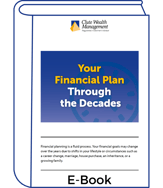
Here they come: the golden years. This decade could be the most critical when it comes to retirement planning. You have a career, a good income, and a plan in place for sending your children to college. However, chances are there are still things you need to do to strengthen your finances in order to retire.
The peak earning years are considered to be during your late 40s through your 50s. You're at a place in your life where you start to consider where you'll want to live in retirement, whether or not you plan to travel, and how much money you'll need to maintain your retirement lifestyle.
Assets and Income
In order to assess your retirement preparedness, ask yourself: Do I have enough money to retire? What is “enough”?
Remember, there's not a cookie-cutter formula to help you calculate your retirement needs. Each person's budget, lifestyle choices and fixed expenses will require targeted planning. Here are some tips to help keep you on course toward achieving your goals.
- Review the income sources you'll have in retirement, such as social security benefits, pension, annuity income, investment income, rental and other potential sources.
- Monitor the asset allocation strategy of your investments at least annually. This is good practice at any age, but assessing whether you're taking too much (or too little) risk is even more important to evaluate as you approach retirement. This is also the time to review your estate plan and how you want your wishes carried out for your family in the event of injury, illness or death.
- Take advantage of tax deferred retirement plans, such as IRA’s, 401(k)’s, etc. (tax deferred compounding can really add up). If you are age 50+, you are eligible for special “catch-up” contributions; speak to your financial planner about your options.
- Take a snapshot of your savings level and be sure to compare from year to year to see if you are making adequate progress toward your financial goals.
- Evaluate Roth IRA conversion options with your financial planner and tax advisor.
Savings and Expenses
During this decade, take an inventory of how you've planned thus far for your retirement years. It's essential that you prepare a realistic estimate of your expenses. Examine them and estimate what they will be upon retirement by preparing a pre- and post-retirement worksheet.
While some experts may advise taking the “customary” percentage of account value as your income at retirement, it won’t be customized to your needs and lifestyle.
Insurance
Your 50s are the time to plan ahead for health care coverage, evaluate long-term care insurance options, review disability coverage, and determine if you still need life insurance. This is the time to carefully assess each type of insurance plan you have, what’s missing, and what policies are right for you.
Debt
It’s important to live within your means no matter your age, especially in our credit-driven society. Be careful about accumulating credit card debt and installment loans; these can jeopardize your ability to accumulate wealth. It's important to evaluate the financial impact prior to borrowing; balance your needs vs wants.
Family
For those baby boomers in their 50s who have young children still at home or in college, determine what (if any) amount you are willing to finance for your children's higher education costs. Be sure to consider if and how it will impact your finances. Remember, you can finance an education – not retirement.
Right Sizing
Right sizing is a term used to describe a process of evaluating housing needs.
Consider right sizing the family home to a smaller, more manageable size to reduce expenses (and upkeep). Reducing overhead may provide you with the ability to pay off your mortgage sooner, as well as provide money to invest.
Financial planning for retirement is a process. Your 50s is a critical time to determine if you’re on course. A CERTIFIED FINANCIAL PLANNER™ can work with you to guide you through this journey. They can help you balance multiple objectives and work with you to determine the specific steps you can take to reach your goals.
Your Financial Plan Through the Decades E-Book
-------------
Heidi Clute, CFP® is co-owner of Clute Wealth Management in South Burlington, VT and Plattsburgh, NY, an independent firm and registered investment advisor that provides strategic financial and investment planning for individuals and small businesses in the Champlain Valley region of New York and Vermont. Clute Wealth Management and LPL are separate entities. The opinions voiced in this material are for general information only and not intended to provide specific advice or recommendations. Traditional IRA account owners have considerations to make before performing a Roth IRA conversion. These primarily include income tax consequences on the converted amount in the year of conversion, withdrawal limitations from a Roth IRA, and income limitations for future contributions to a Roth IRA. In addition, if you are required to take a required minimum distribution (RMD) in the year you convert, you must do so before converting to a Roth IRA.
Securities offered through LPL Financial. Member FINRA/SIPC.


